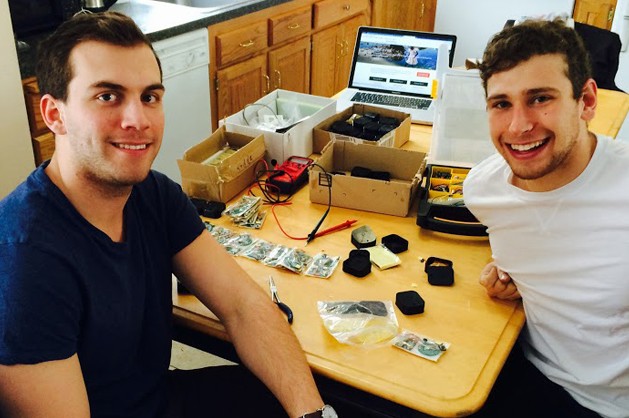Steven Graf ’15 (BUS) couldn’t stop thinking about what he had seen in Ghana after a May 2013 trip there with Global Brigades, a student organization that focuses on helping developing countries.
The group, which included doctors, set up a health care clinic in a rural community. Many of the patients hadn’t previously had access to health care, according to Graf.
“Everyone in the surrounding area came, free of charge. We’d do the triage, they’d get a prescription, then they’d go to the pharmacy [at our clinic] to pick it up,” he says. “At the end of the week, we went back to talk to everyone. Fifty percent of the people that we were helping were doing worse or the same.”
The group soon learned that because most of the people being treated were illiterate, they couldn’t read the prescription label and forgot how to properly take their medications, says Graf, a health care management major.

Medication adherence, or lack thereof, is a significant problem worldwide. According to the World Health Organization, 50 percent of patients in developed countries do not take medications as prescribed. Poor adherence leads to spikes in morbidity and death rates, and wastes hundreds of billions of dollars in health care costs.
For about six months after his trip, Graf thought about how he could help people like those he met in Ghana. Finally, he had an idea. He teamed up with friend Charles Fayal ’16 (ENG) to create Parrot MD, a simple recording device that allows physicians to record verbal instructions and send them home with patients.
Graf and Fayal, a biomedical and electrical engineering major, worked with an advisor from the biomedical engineering department to create an independent study about their idea. They secured about $2,800 in funding from UConn’s Office of Undergraduate Research and Connecticut Center for Entrepreneurship and Innovation in the School of Business.
The latest Parrot MD model, which costs about $2 per unit to make, consists of a small commercial recording device, like the kind found in a singing greeting card, and a 3D-printed case.
“Our main goal is to get the whole thing to under $1 cost-wise so we can give them out more loosely,” Graf says. As quantities increase, bulk pricing for the recorders should help achieve that goal.
And it looks like they’ll be needing more units.
Feedback from the community
In March, Fayal and Graf traveled to Guatemala with an organization called Partners In Development to meet with doctors, nurses, and other health care workers to gauge the need for something like Parrot MD.
With a translator in tow, they met with doctors who worked with a more affluent population, as well as those who provided free health care to sugar cane farmers in an impoverished village.
“We got some incredible feedback,” Fayal says. “The doctors really liked the idea.”
One Spanish-speaking doctor faced a language barrier with his indigenous patients, many of whom spoke Mayan languages, Graf says. The patients’ translators could use the device to record instructions.
They also learned that multiple prescriptions contributed to confusion among patients.
“A lot of these patients come in for multiple medications, whether it’s because they have a few kids or they’d get a cream, a suspension, and an antibiotic for themselves. Each of these obviously has different directions, which are really easily forgotten,” Fayal says. “The pharmacist told us she had people who would come in the next day, and the day after that, asking ‘How do I take this?’ ‘How do I do this?’ So that really confirmed that they need this.”
Another boost of confidence came from the head of Partners in Development, Gale Hull, who participated in the Guatemala trip.
Although she was at first apprehensive about the “quirky” product, Graf says, “after seeing what it could do in a community like that, she was really excited about it.” One of the next steps is actually deploying the devices, and she has asked to buy some to try to get them into Mississippi, Haiti, and Guatemala.
Moving forward
Now, the two students hope to do a cost-benefit analysis for Parrot MD and decide whether they want to move forward as a non-profit or for-profit organization.
“We want to continue building products and devices that can help people in the developing world, and then maybe bring them over to the developed countries,” Graf says. “One thing we’ve noticed is that there is a need for this sort of thing even in places like America and Europe.”
They’re currently preparing for UConn’s Innovation Quest competition, in which the first-place winner receives $15,000 and the opportunity to participate in a business incubator.
Says Graf, “We’re hoping to do that and start this thing up.”
Learn more at parrotmd.org.



